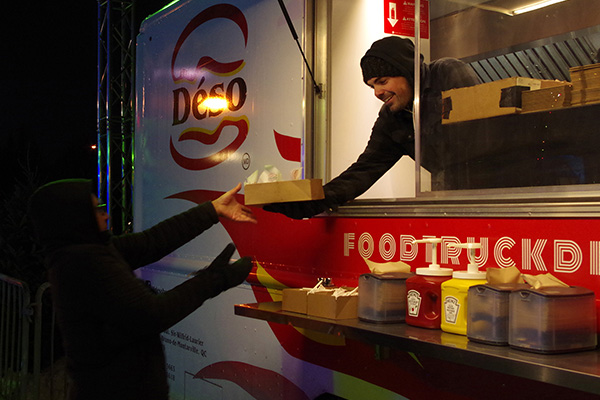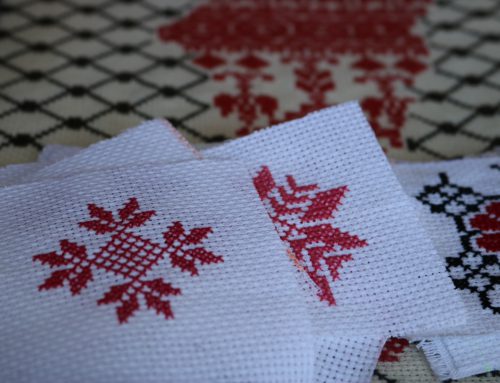BY Olivier Neven & Victoria Lewin
Patrick Marcovecchio owns the Queues de Castor food truck. He believes that having the truck is a great way to grow the Queues de Castor brand.
“Our trucks act like embassies for us, meaning that we’re able to serve customers in areas where we don’t have a shop nearby,” he says. “For those who can’t visit us in spots like Old-Montreal or Tremblant, we’re able to bring our treats to them.”
But while Marcovecchio drives his truck through the streets of Montreal, you’ll rarely find him parked on the side of the road. He’s more comfortable working private events or festivals, like the Fête des neiges at Parc Jean-Drapeau.
“In 2015, we submitted our candidacy with the city to start working on the public circuit, but we ended up deciding against it because of all the regulations regarding what we can do with our truck,” Marcovecchio says. “Given the opportunity to just stick to events, on a financial level, it was a no-brainer.”
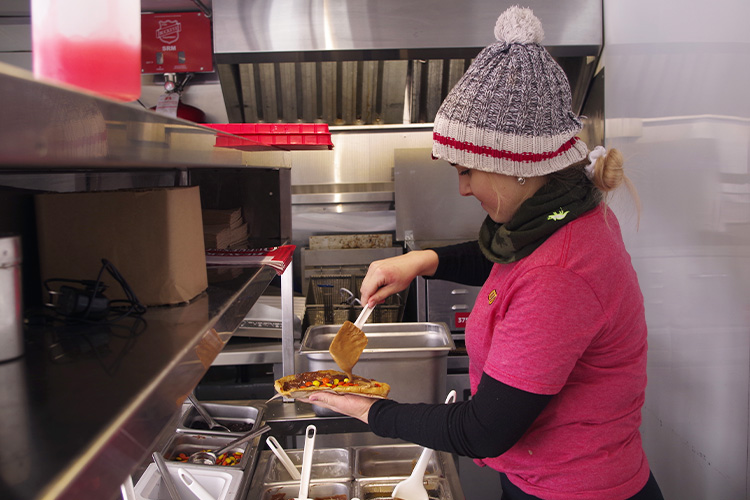
Kayla Marcovecchio decorates a hot beaver tail with chocolate and peanut butter from the BeaverTails food truck at Fêtes des Neiges. Photo by Victoria Lewin.
Montreal’s Food Truck Association now has over 100 registered members, offering everything from smoothie bowls to schnitzel. With a great variety in cuisine and high quality products, one would think that food trucks would thrive in a city that prides itself on its gastronomic reputation.
But the numbers of trucks on the streets of Montreal have actually gone down. Many owners are preferring to go to special events instead.
Brossard’s Fest Hiver Hosts Food Trucks. Video by Victoria Lewin.
Gaelle Cerf takes inventory of the pulled pork that has been pre-packaged to be served at the Grumman ‘78 kiosk at Time Out Market. Shelves full of produce and packages of meat line the walls in the small cold room of their Saint-Henri restaurant.
“All this food isn’t even half as much as we stock for the summer season,” she says. “That’s when we’re busiest and our food truck is out and about in the streets of Montreal.”
Cerf’s Grumman ‘78 truck is one of the pioneers of Montreal’s modern food truck industry. It hit the road in 2010, along with the restaurant bearing the same name.
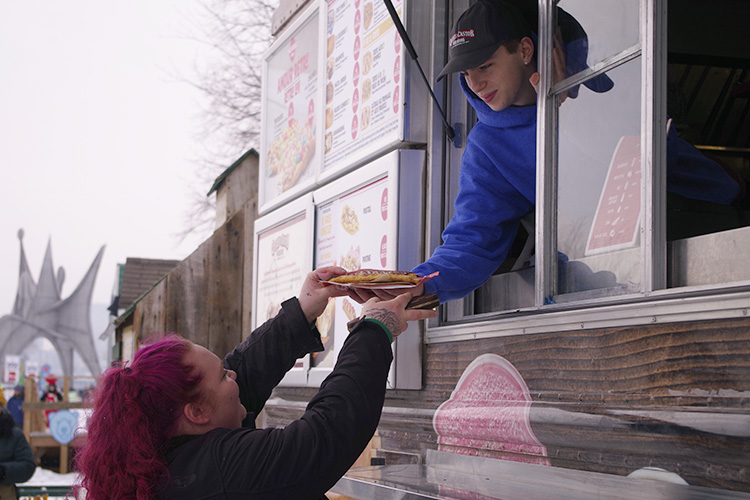
Domenico Ricci hands food truck-goer Aimee Denault a sugar-covered beaver tail at Fêtes des Neiges. Photo by Victoria Lewin.
“Three or four years after we started, there were already more than 20 food trucks in Montreal,” says Cerf, who is also vice-president of the Associations des Restaurateurs de Rue du Québec. “Entrepreneurs saw an opportunity to evolve and grow their restaurant businesses, which was super interesting to see develop.”
But those entrepreneurs have run into a big bump in the road—municipal red tape.
A Timeline of Montreal’s Food Truck Permits. Media by Olivier Neven.
“The biggest obstacle for these food trucks is that they have to be affiliated to a restaurant or industrial kitchen space to be allowed to operate,” says Tim Forster, editor of Eater Montreal. “Without that connection, you can’t get a permit and that’s been a deterrent for a lot of people interested in this kind of business.”
Christophe Gay took over Gaufrabec in 2018 and discontinued the food truck. He now focuses on serving his belgian waffles at events and distributing them around the province.
“I took on Gaufrabec because I thought it would be fun and challenging,” the native of Avignon, France says. “I find it rewarding to try growing the business myself, and the experience of meeting people and making them happy at these kinds of events.”
Standing in a small wooden shack, sporting a beard, round glasses and a thin curled mustache, Gay is in his element as he serves up treats at the Fête des neiges.
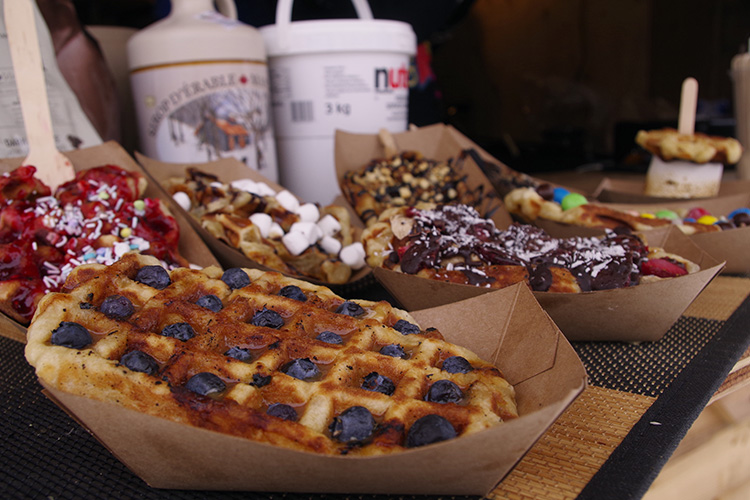
A tasting display of waffles in an assortment of flavours at former food truck Gaufrabec during Fêtes des Neiges. Photo by Victoria Lewin.
“If I had a food truck, I would have to travel around the city to random spots, with no real guarantee of business,” he says. “I prefer to do events and festivals, where we can focus more on the food we’re serving and less on the look or marketing of our trucks.”
Some food truck owners, like Alexandra Bonnet of Boîte à Fromages, understand the importance of marketing their truck and making it visually appealing.
“Some say you eat with your eyes, so anything the customer sees should attract them to your truck,” the owner says. “Everything from the dish you serve to the look of the truck itself must stand out.”
One significant hurdle the food truck industry is also struggling with is appealing to the average Montrealer. Many are unimpressed by the lack of accessibility, high price points, and small portions served by many street food vendors.
“Customers see food trucks as, like, takeout food and they expect it to be cheap,” Forster says. “So food truck operators have to find the sweet spot in setting reasonable price points while offering a good product.”
But Cerf believes it’s hard to ask food trucks to lower their prices. She wouldn’t want it to come at the cost of good quality food, and most food trucks look to operate in the most eco-friendly manner possible.
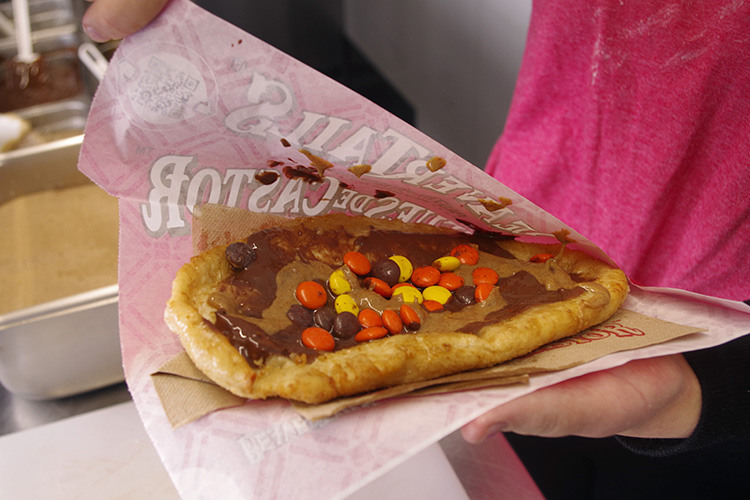
A Reeses chocolate-coated beaver tail ready to be served up to a hungry Beaver Tails food truck customer at Fêtes des Neiges. Photo by Victoria Lewin.
“For example, the little trays we use to serve tacos are compostable and cost three times more than a styrofoam tray,” she says. “I think by educating the clientele on the costs of running a food truck, our customers will understand why we have to adapt and adjust our prices accordingly.”
Some trucks, like Boîte à Fromages, offer gourmet specialties that are sure to cost more than your average hot dog or poutine.
“The gourmet aspect of what I offer makes it more challenging for me to compete with other trucks, in terms of pricing,” says Bonnet. “But I’m proud to offer high quality food, even if it might mean a more expensive menu.”
As for accessibility, Bonnet expects the city to promote food trucks and give Montrealers accurate information on where to find them.
“Clients are always telling me that they don’t know where to look to know where our truck will be on a given date,” she says. “The city should have a platform where they inform the public on where and when they can find their favourite trucks.”
As things stand, sticking to events or private contracts might be the best option for most of Montreal’s food truck community. The uncertainty and difficulties that come with running a food truck on the public circuit are keeping street food vendors away from the busy street corners of Montreal.
Unless changes are made, Montreal will likely not become a big food truck hub like a lot of other North American cities are, at least not for the foreseeable future.
